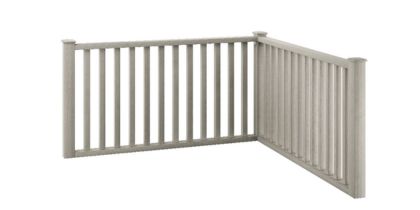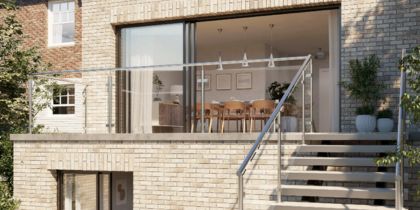What is the Best Material for a Balustrade?

When it comes to choosing the best material for a balustrade, there are several factors to consider. The material you choose will affect not only the aesthetics of your balustrade but also its durability and maintenance requirements.
In this article, we will explore some of the most popular materials used for balustrades and their benefits and features. Read on to make an informed decision for your next garden balustrade project.
Factors to Consider When Choosing a Balustrade Material
Here are some things to consider when choosing balustrade materials:
Durability and Strength: The material of the decking balustrade should be sturdy enough to withstand force without bending, sagging, or breaking over time. Wrought iron, steel, aluminium, stone, and concrete rate highly on strength.
Safety: Materials that are difficult to climb like glass and metal, with narrow gaps, enhance safety.
Weather Resistance: Garden balustrades should endure sun, rain, and temperature swings. Aluminium, vinyl, concrete, and stone hold up well.
Appearance: It’s important to match the style of your home, whether it’s classic wood or modern metal and glass. Finishes like paint or stains can also impact the overall look.
Maintenance: Some materials like wood and wrought iron require frequent upkeep. However, there are low-maintenance options available such as composite, aluminium, vinyl, and PVC.
Cost: Prices can vary depending on your budget. Wood and vinyl are generally more budget-friendly options, while wrought iron, aluminium, and glass tend to be higher-end choices. Keep in mind that installation can also affect the overall project cost.
Popular Balustrade Materials
Now let's explore popular balustrade materials in-depth:
Composite: The Low-Maintenance Choice
Composite balustrades made of recycled wood and plastic fibres combine the look of wood with the durability and low maintenance of synthetic materials.
They are highly resistant to moisture, decay, insects, and weathering. They do not require refinishing and are less prone to cracking, peeling, or warping compared to wood. The downside is the higher upfront cost than natural wood. Moreover, they are both eco-friendly and stylish – the ideal finishing touch for any outdoor area.
Our composite balustrades for decking are available in a range of wood-like colours and grain patterns, which work well in a variety of installations: Charcoal Clarity, Walnut Clarity, Autumn Clarity, Graphite Clarity, and Ash Clarity.

Wood: The Classic Choice
Wood is a popular choice for balustrades due to its naturally attractive grain patterns, which add warmth and character to any space. It is also known for its ease of installation and the ability to customize it through millwork.
However, wood does require regular maintenance to keep it in good condition. If not properly sealed and finished, wood is susceptible to issues such as rot, cracking, and insect damage. To ensure the longevity of your wood balustrade, it’s important to follow the manufacturer’s instructions for care and maintenance.
Stainless Steel: The Strong, Stylish Choice
Stainless steel balustrades have a sleek and modern look that can enhance the overall appearance of a space. They are made from a strong and durable material that can withstand various weather conditions and resist corrosion.
Our variety of steel balustrades are incredibly durable due to the high-quality materials used in their manufacture. Additionally, stainless steel is a highly recyclable material, making it an environmentally friendly choice.
However, it’s important to note that the installation of stainless steel balustrades may require specialized tools and expertise.

Aluminium: The Corrosion-Resistant Choice
Aluminium is a lightweight yet strong material that offers excellent durability for balustrades. It resists rust, scratches, and stains even in outdoor environments, making it ideal for long-lasting use with minimal maintenance. Additionally, its reflective surface adds a contemporary edge to any space.
One of the advantages of aluminium is its versatility in shaping. It can be easily formed into modern curved forms and custom cut to size, allowing for creative designs that suit your preferences. Compared to wrought iron and steel, aluminium is less prone to dents, noise, and oxidation.
While aluminium may be more expensive than other metals, it compensates for its higher cost through its longevity and no-fuss upkeep.
Glass: The Elegant Choice
Glass balustrades create an airy and luminous atmosphere with their transparent nature. They offer unobstructed views and allow natural light to penetrate the space. Our range of glass balustrades features toughened glass and high-tensity wire options.
Tempered and laminated glass options are known for their strength and shatter-resistant properties, but they require specialized installation and regular cleaning.
For enhanced privacy, you can opt for frosted or tinted glass. Additionally, consider incorporating decorative metal railings to provide added safety when using glass balustrades.
Glass balustrade systems are well-suited for contemporary, minimalist, and industrial interiors, but it’s important to note that they come at a premium price point. To maintain their pristine condition, handle glass balustrades with care to prevent chips and cracks.
Stone: The Classic Natural Choice
Natural stone, such as granite, marble, and limestone, is an excellent choice for balustrades if you’re looking for an organic yet upscale aesthetic. Stone brings a timeless elegance to any space and is known for its extreme durability. It can resist stains, scratches, and UV rays that can damage other materials.
Stone balustrades are particularly well-suited for traditional exteriors as they complement the overall look. However, it’s important to note that stone balustrades require sealing to avoid moisture damage. Stone balustrades can be quite expensive due to their labour-intensive installation and weight limitations.
Concrete: The Customizable, Affordable Choice
Concrete is known for its ability to withstand weather and use with minimal upkeep and to add a touch of minimalist appeal.
Concrete also offers design flexibility, allowing it to be moulded into any shape, from crisp, modern angles to fluid curves. Techniques such as staining and texturing, and featuring exposed aggregate, can be used to create unique appearances and disguise imperfections.
However, it’s crucial to have the necessary skills and expertise for proper installation. Also, concrete can develop cracks over time and requires sealing. New advances like GFRC (glass fibre-reinforced concrete) have been introduced to increase durability.
PVC/Vinyl: The No-Fuss Maintenance Choice
Polyvinyl chloride (PVC), also known as vinyl, is an excellent choice for balustrades if you’re looking for a material that requires zero maintenance. It is available in white and copolymer colours and offers resistance against moisture, decay, and insects. Unlike wood, vinyl won’t pit, peel, blister, or require painting.
While vinyl has good impact resistance, it has weaker structural strength compared to metal or wood. It’s important to note that poorly formulated vinyl can become brittle after prolonged sun exposure.
However, higher-quality marine-grade vinyl formulated for exterior use provides superior weathering properties and longevity. It’s worth mentioning that vinyl designs may offer less intricacy compared to wood or wrought iron designs.
How to Compare Balustrade Materials
The best balustrade material for you depends on various factors. When comparing balustrade materials, it’s important to analyze how each material meets your priorities such as budget, outdoor use, and visual appeal.
For example, if low maintenance is your top priority, PVC and composite materials are highly recommended. On the other hand, if you prefer a modern style, stainless steel, glass, and concrete balustrades are design-forward options.
It’s also crucial to weigh practical factors like cost and durability against aesthetic considerations that align with your home. Keep in mind that an inexpensive material like vinyl may require frequent replacement, which can ultimately cost more than investing in a durable premium material like stainless steel. Additionally, installation challenges, location, traffic, and height should also inform your decision.
Before designing your balustrade, thoroughly examine the advantages and trade-offs of each material and ensure that you follow local building codes for safety. Lastly, proper installation by an experienced contractor is key to ensuring your balustrade enjoys a long lifespan while accentuating your home’s beauty.
Feel free to contact us if you need help selecting the ideal balustrade material for your next project.



